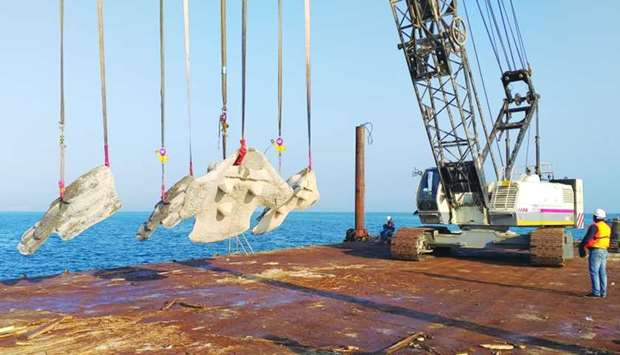Qatargas completes installation of Artificial Coral Ridge modules off Banana Island
Qatargas Operating Company Limited (Qatargas), in collaboration with the Ministry of Municipality and Environment (MME), has successfully completed the installation of two hundred artificial coral ridge modules off Banana Island.
The artificial coral ridge installation project is testament to Qatargas’ commitment to protect Qatar’s rich offshore biodiversity, and is aligned with the Environmental Development pillar of Qatar National Vision 2030 that calls for protection of Qatar’s unique environment and nurture such abundance of nature.
The project involved performing a Marine Environmental Assessment (MEA) of various recipient marine locations, in cooperation with the MME. After an appropriate site assessment, the location was selected to accommodate such imitative. The design of the artificial ridge modules were studied carefully to ensure its mimic the natural Qatari marine environment, and fabricated locally in Qatar using environmentally friendly materials following the MME’s guidance.
Environmental conservation is one of the core beliefs at Qatargas and the company strives to preserve marine life form as part of its corporate social responsibility initiatives. In line with these initiatives, in 2007 nearly 4,500 living hard corals had been relocated from near-shore pipelines area to a suitable coral reef area during the construction of LNG expansion projects.
Following this, approximately 3,000 hard corals were transferred during 2012-2014 to an appropriate recipient location north of Qatar. Such initiatives were undertaken in compliance with local and international regulatory requirements and in full cooperation and coordination with the MME.
Qatargas is a pioneer in the LNG industry in installing artificial coral ridge modules that quickly evolve into a vibrant and thriving habitat with a richly biodiverse ecosystem. Creation of such habitats also serves to underline the company’s commitment to protect Qatar’s precious biodiversity and improve its climate resilience.
The artificial coral ridge installation project is testament to Qatargas’ commitment to protect Qatar’s rich offshore biodiversity, and is aligned with the Environmental Development pillar of Qatar National Vision 2030 that calls for protection of Qatar’s unique environment and nurture such abundance of nature.
The project involved performing a Marine Environmental Assessment (MEA) of various recipient marine locations, in cooperation with the MME. After an appropriate site assessment, the location was selected to accommodate such imitative. The design of the artificial ridge modules were studied carefully to ensure its mimic the natural Qatari marine environment, and fabricated locally in Qatar using environmentally friendly materials following the MME’s guidance.
Environmental conservation is one of the core beliefs at Qatargas and the company strives to preserve marine life form as part of its corporate social responsibility initiatives. In line with these initiatives, in 2007 nearly 4,500 living hard corals had been relocated from near-shore pipelines area to a suitable coral reef area during the construction of LNG expansion projects.
Following this, approximately 3,000 hard corals were transferred during 2012-2014 to an appropriate recipient location north of Qatar. Such initiatives were undertaken in compliance with local and international regulatory requirements and in full cooperation and coordination with the MME.
Qatargas is a pioneer in the LNG industry in installing artificial coral ridge modules that quickly evolve into a vibrant and thriving habitat with a richly biodiverse ecosystem. Creation of such habitats also serves to underline the company’s commitment to protect Qatar’s precious biodiversity and improve its climate resilience.

